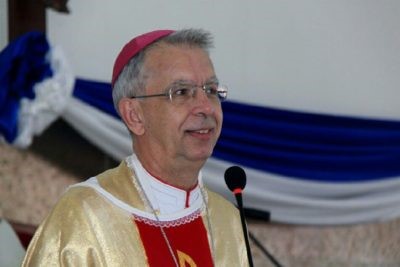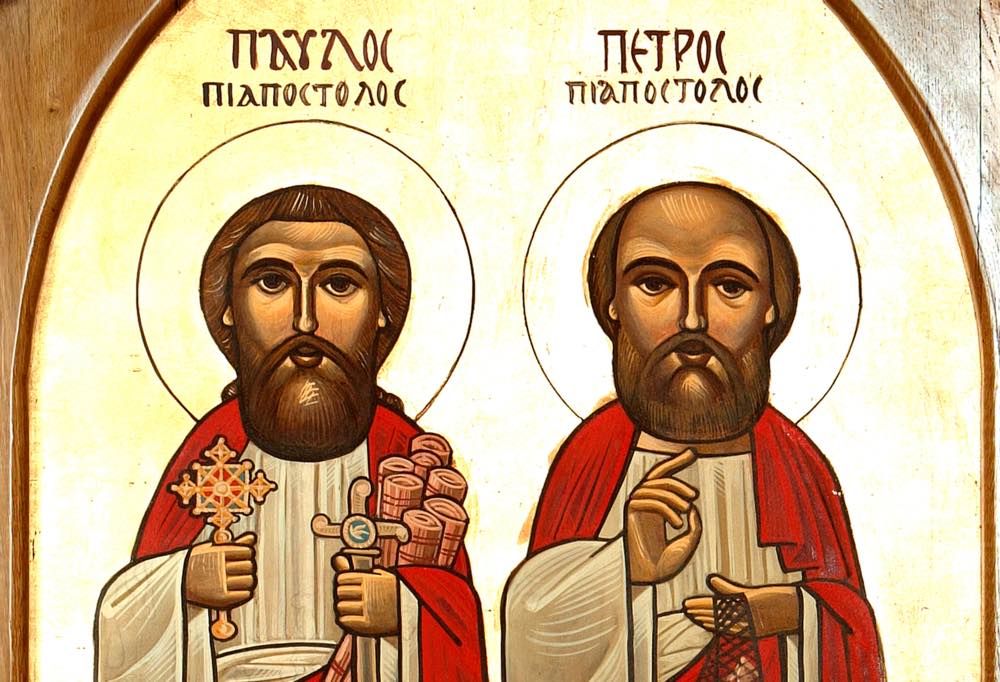– Marco Carvalho
Pope Francis has introduced a year of missionary experience in the curriculum of the future diplomats of the Holy See. The new rule was announced in the middle of the current month in a letter sent to Joseph Salvador Marino, the American prelate that is currently responsible for the Pontifical Ecclesiastical Academy, the famous Vatican school where the diplomats who will serve in the network of the Apostolic Nunciature are trained. The new specification drew applause in Macau.
In his letter, the Supreme Pontiff asks Marino (shown in photo) to include in the curriculum of future diplomats at least one year of missionary experience in a local Church. The Pope believes that this “new personal experience of mission outside the dioceses of origin” enriches the “solid apostolic and pastoral formation” provided by the Pontifical Ecclesiastical Academy.
Father Franz Gassner, a missionary of the Society of the Divine Word, applauds the recommendation made by Pope Francis and sustains that the missionary experience will offer future nuncios precious time to prepare for the diplomatic functions with which they will be invested later in their career.
An assistant professor at the University of Saint Joseph (USJ), Gassner claims that the decision now made by the Roman Curia should have been made earlier: “This may be new for the Holy See, but it is not really revolutionary, as it follows standard procedures of formation in many missionary religious congregations in view of globalization and contemporary developments. Within my own congregation, the Society of the Divine Word, we have the option of an Overseas Training Program since 1982,” the Austrian priest recalls.
“Seminarians as future missionaries should go out for 2 or even 3 years and spend precious time in a new culture and country. This is done during the normal formation period, with the goal to get already familiar with a new culture and language, and of course a specific local ecclesiastical situation. This turned out to be very fruitful and helpful, especially due to the fact that for younger people it is much easier to learn a new language and understand a totally different culture,” he claims.
A teacher at the Faculty of Religious Studies of the University of Saint Joseph, Father Gassner is fully convinced that, if the measures now announced by Pope Francis are rightfully implemented, the new prerogatives for the formation of future Holy See diplomats could help the Roman Curia to better understand the different dynamics of the local Churches. Diplomats with a deeper knowledge of local realities, the Austrian priest argues will be able to contribute more efficiently to the unity and mission of the Church: “With this new element of formation, the future Diplomats of the Holy See will gain a better understanding of local churches, their culture, needs, talents, and challenges,” the SVD missionary says. “If implemented well, it will for sure benefit the diplomatic network of the Holy See greatly, because the future diplomats with be more familiar with a local situation, speak the language well, and are able to build better bridges between local churches and the Holy See, which is very important for the unity and mission of the church. Obviously, Pope Francis does not want diplomats to be mere technical intermediaries and managers of affairs, but to be able to go out and to become ‘shepherds with the smell of sheep.’ This is in line and very consistent with Francis’ overall pastoral approach,” Father Gassner concludes.
The new formative experience will come into effect next year, with students attending the Pontifical Ecclesiastical Academy in the academic year 2020/2021 being the first ones to submit to the rules. The objective expressed by the Holy See – in line with what is highlighted by Father Franz – is to enable future apostolic nuncios to take part in “daily evangelizing activities” with local Churches around the world.
For Jesuit Jaroslaw Duraj, this new set of rules will help to close a gap that is hindering the evangelical work promoted by the Catholic Church: “Personally, I am very glad that the Pope introduced this change. This will help the representatives of the Holy See to be a little more acculturated in the given context of their respective diplomatic service,” the Polish priest believes. “The nuncios sometimes seem to be detached from the reality of the missionary context. If they do not understand the real social conditions and culture of a country, how can they help the Holy See to properly address the religious issues of the place where they serve?” Father Duraj asks.
The Jesuit, a researcher at the Ricci Institute of Macau, considers that the decision announced this month by Pope Francis will forcibly raise the expectations of the local Churches regarding the role played by the diplomatic network of the Holy See. The Polish priest recognizes that the effectiveness of this new rule will depend very much on the rigor with which it is implemented. He praises, nevertheless, the reformist impulse of Jorge Mario Bergogolio: “We shall see how it will work out. I do not want to speculate too much. I only see that Pope Francis is very consequent in applying his policy of the Roman Curia reform for the sake of evangelization. I suggest you read an excellent address to nuncios in 2019 in which the Pope speaks about the Nuncio Decalogue they should follow,” Father Duraj advises.
The decision is, in practical terms, the first measure taken by the Supreme Pontiff in the context of the apostolic exhortation Dear Amazon, in which – to make up for the lack of priests in vast areas of the Amazon rainforest – Francisco proposed an increase in the number of missionaries.
The Argentine Pope had already expressed in his final speech at the Synod of the Amazon how important it is, for the Holy See diplomats, to spend a year in the most deprived areas of the world: “For Europe, which needs to wake up; for Africa, thirsty for reconciliation; for Latin America, hungry for food and interiority; for North America, determined to rediscover the roots of an identity that is not defined by exclusion; for Asia and Oceania, challenged by the ability to dialogue with the vastness of ancestral cultures,” the Pontiff remarked at the time.


 Follow
Follow


